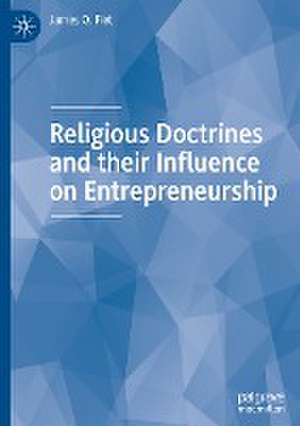Religious Doctrines and their Influence on Entrepreneurship
Autor James O. Fieten Limba Engleză Hardback – 26 noi 2023
Preț: 893.84 lei
Preț vechi: 1090.06 lei
-18% Nou
Puncte Express: 1341
Preț estimativ în valută:
171.04€ • 182.90$ • 142.61£
171.04€ • 182.90$ • 142.61£
Carte tipărită la comandă
Livrare economică 18 aprilie-02 mai
Preluare comenzi: 021 569.72.76
Specificații
ISBN-13: 9783031433856
ISBN-10: 3031433858
Ilustrații: XXXI, 283 p. 7 illus., 6 illus. in color.
Dimensiuni: 148 x 210 mm
Greutate: 0.53 kg
Ediția:1st ed. 2023
Editura: Springer Nature Switzerland
Colecția Palgrave Macmillan
Locul publicării:Cham, Switzerland
ISBN-10: 3031433858
Ilustrații: XXXI, 283 p. 7 illus., 6 illus. in color.
Dimensiuni: 148 x 210 mm
Greutate: 0.53 kg
Ediția:1st ed. 2023
Editura: Springer Nature Switzerland
Colecția Palgrave Macmillan
Locul publicării:Cham, Switzerland
Cuprins
Part I Doctrines in Entrepreneurship.- 1. The Origin of Religious Preconceptions.- 2. Ranking Doctrinal Effectiveness.- 3. Analytical Organization.- 4. Christian Denominations and Their Doctrines.- 5. World Religions and Their Doctrines.- Part II Doctrinal Differences among Christian Denominations.- 6. Adventist Doctrine and Entrepreneurship.- 7. Baptist Doctrine and Entrepreneurship.- 8. Christian Scientist Doctrine and Entrepreneurship.- 9. Church of Jesus Christ of Latter-Day Saint Doctrine and Entrepreneurship.- 10. Congregationalist Doctrine and Entrepreneurship.- 11. Disciples of Christ Doctrine and Entrepreneurship.- 12. Eastern Orthodox Doctrine and Entrepreneurship.- 13. Episcopalian Doctrine and Entrepreneurship.- 14. Jehovah’s Witnesses’ Doctrine and Entrepreneurship, etc.
Notă biografică
James O. Fiet is the Brown-Forman Chair in Entrepreneurship and Professor of Management at the University of Louisville, USA. He founded both the entrepreneurship PhD program and the Institute for Entrepreneurial Research. He is in the top 1% of all entrepreneurship researchers world-wide with more than 63,000 research reads.
Textul de pe ultima copertă
“There are those who say that Religion and entrepreneurship do not mix. With this book, Fiet shatters this myth. For many entrepreneurs, their faith has been a central influence in shaping their worldviews. This book provides an excellent resource for pursuing such inquiries.”
— Lowell Busenitz, Professor Emeritus of Entrepreneurship, University of Oklahoma, United States
“Professor Fiet examines what effect a belief system would have on entrepreneurial outcomes, while providing his own rationale. He is quick to point out that readers could differ. However, the framework offered by Fiet’s book could greatly reduce confusion about where disagreements exist.”
— Jeffery S. McMullen, David H. Jacobs Chair in Strategic Entrepreneurship and Professor of Entrepreneurship, Indiana University, United States
“Professor Fiet advances the field from a general understanding of religion to a specific application of the different doctrines withinand between different religions. This book makes an important contribution to the future of scholarship by highlighting how and why these distinctions matter. It provides a comprehensive, provocative, and even controversial analysis of the role of religion in entrepreneurship.”
— Brett Smith, Founder Director, L.I.F.E. (Leading the Integration of Faith & Entrepreneurship) Research Center, Miami University, United States
This book explores how religious doctrines influence launching a new venture. It is not an examination of doctrinal veracity. Rather, it examines how entrepreneurs see their work, assuming they receive what they expect from their doctrines. More than 100 years ago, Max Weber pitted Protestantism against Hinduism. The current study is a multifactorial examination that updates Weber’s initial findings.
James O. Fiet is the Brown-Forman Chair in Entrepreneurship and Professor of Management at the University of Louisville, USA. He founded both the entrepreneurship PhD program and the Institute for Entrepreneurial Research. He is in the top 1% of all entrepreneurship researchers world-wide with more than 63,000 research reads.
— Lowell Busenitz, Professor Emeritus of Entrepreneurship, University of Oklahoma, United States
“Professor Fiet examines what effect a belief system would have on entrepreneurial outcomes, while providing his own rationale. He is quick to point out that readers could differ. However, the framework offered by Fiet’s book could greatly reduce confusion about where disagreements exist.”
— Jeffery S. McMullen, David H. Jacobs Chair in Strategic Entrepreneurship and Professor of Entrepreneurship, Indiana University, United States
“Professor Fiet advances the field from a general understanding of religion to a specific application of the different doctrines withinand between different religions. This book makes an important contribution to the future of scholarship by highlighting how and why these distinctions matter. It provides a comprehensive, provocative, and even controversial analysis of the role of religion in entrepreneurship.”
— Brett Smith, Founder Director, L.I.F.E. (Leading the Integration of Faith & Entrepreneurship) Research Center, Miami University, United States
This book explores how religious doctrines influence launching a new venture. It is not an examination of doctrinal veracity. Rather, it examines how entrepreneurs see their work, assuming they receive what they expect from their doctrines. More than 100 years ago, Max Weber pitted Protestantism against Hinduism. The current study is a multifactorial examination that updates Weber’s initial findings.
James O. Fiet is the Brown-Forman Chair in Entrepreneurship and Professor of Management at the University of Louisville, USA. He founded both the entrepreneurship PhD program and the Institute for Entrepreneurial Research. He is in the top 1% of all entrepreneurship researchers world-wide with more than 63,000 research reads.
Caracteristici
Compares the doctrinal rankings across denominations First book to explore the impact of faith on entrepreneurial effectiveness Ranks the entrepreneurial effectiveness of the doctrines of 16 Christian denominations and 9 world religions
